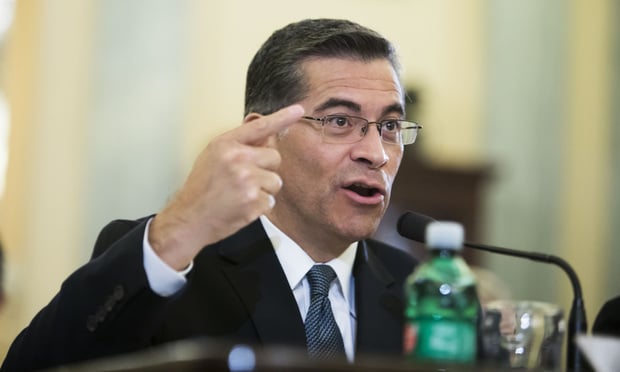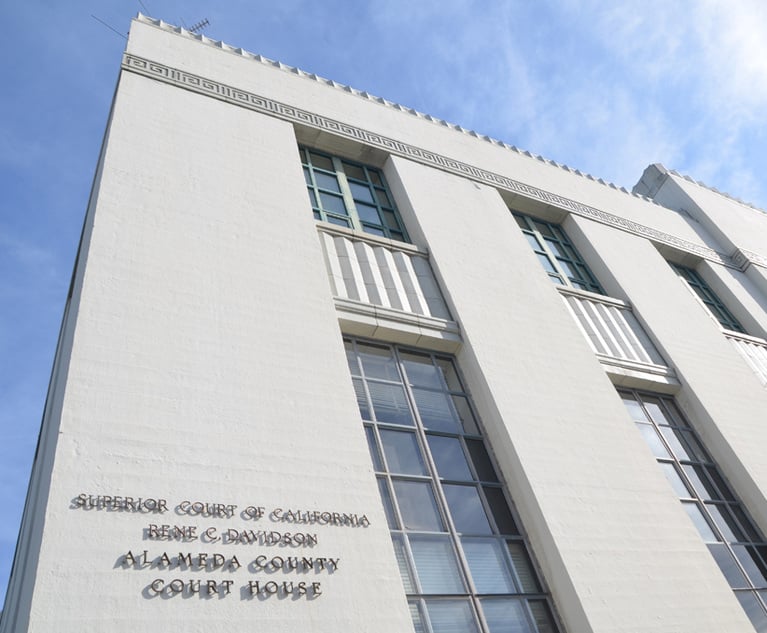'We Need to Deliberate': Democratic AGs Plot Obamacare Defense Strategy
"This is late in the session for the court to be taking up cases, but this is a critical one," California Attorney General Xavier Becerra said.
December 19, 2019 at 06:14 PM
5 minute read
 California Attorney General Xavier Becerra testifies in Washington in September. Photo: Diego M. Radzinschi/ ALM
California Attorney General Xavier Becerra testifies in Washington in September. Photo: Diego M. Radzinschi/ ALM
California Attorney General Xavier Becerra said Thursday he wants to swiftly ask the U.S. Supreme Court to consider the legality of the Affordable Care Act in light of the new ruling this week from the U.S. Court of Appeals for the Fifth Circuit.
Becerra's enthusiasm for a quick appeal, however, has not been matched by some of his Democratic colleagues, who are seeking a more deliberative approach to defending the Obama-era health care law.
On a call with reporters Thursday, leaders from three states that had joined California in defending Obamacare in court were noncommittal about filing a cert petition in the coming weeks.
"The most important thing is that we are ultimately successful," said Kentucky Gov. Andy Beshear. "While I want to move with speed, the ultimate priority is protecting health care, and I'm in this fight for as long as it will take."
North Carolina Attorney General Joshua Stein said he didn't "want to get hung up on dates," as the deadline for asking the high court to consider a case this term approaches quickly. The justices generally stop adding cases to the argument in January.
"I can't think of a reason why we wouldn't want to seek cert, but we need to deliberate," Stein told reporters.
The hesitation reflects the political realities of the coalition comprising 20 states and the District of Columbia that is defending the Affordable Care Act.
Challenging Trump administration initiatives in court has become routine for Becerra, who is backed by Democratic supermajorities in both legislative houses, a Democratic governor and Democrats who control every statewide office. That's not the case for Beshear, Stein or Michigan Attorney General Dana Nessel, who was also on Thursday's call.
The debate also acknowledges the political—and legal—gamble at play. If the Supreme Court takes up the case in 2020, it could add fuel to the national debate over health care, a top issue among voters, before the presidential election. Or it could mean a speedy demise for a program that has extended health care coverage for millions of Americans.
The Fifth Circuit's decision "did President Trump and Republicans a big favor and sent the case back down to the same judge and in so doing all but ensured that there would be no ruling on the law's fate until after the 2020 election," Abbe Gluck, a Yale law professor, said in a piece at The New York Times. "The court has enabled Mr. Trump to escape accountability to the voters for his efforts to destroy the law."
Gluck, who has written extensively on the ACA, called Becerra's push to quickly get the Supreme Court to review the appeals court ruling a "long shot."
 Supporters of the Affordable Care Act rally at the US Supreme Court. Photo: Diego M. Radzinschi / ALM
Supporters of the Affordable Care Act rally at the US Supreme Court. Photo: Diego M. Radzinschi / ALMThe appeals court on Wednesday said the Affordable Care Act's individual mandate is unconstitutional, upholding a declaration from a Texas trial judge. The appeals court, however, stopped short of declaring the entire law unlawful, as the trial court did. The three-judge panel sent the dispute back to the district court for a do-over on whether the individual mandate can be severed from the rest of the law.
Trump's Justice Department initially said the mandate could be severed, but then the government went further and fully embraced the Texas court's complete knockdown of Obamacare.
"The Trump administration has changed its position on the severability issue several times, making it a necessity for the lower court to review the provisions of the ACA that have nothing to do with coverage," Stephanie Kennan of McGuireWoods Consulting said in a statement. "This, however, delays the opportunity for the Supreme Court to take up the case, meaning the uncertainty about the law's future continues and will not likely be settled before the election."
Nessel, the Michigan attorney general, told reporters she is not confident the Supreme Court would immediately take the case.
"I would be surprised if they wanted the district court to rule on it before it went back up the chain," she said.
Becerra noted that the high court moved quickly this year to hear a challenge to the Trump administration's plan to add a citizenship question to the 2020 census. On a 5-4 ruling, the court ruled in June that the question could not be included, calling the U.S. Commerce Department's arguments for doing so "contrived."
"This is late in the session for the court to be taking up cases," Becerra acknowledged, "but this is a critical one."
This content has been archived. It is available through our partners, LexisNexis® and Bloomberg Law.
To view this content, please continue to their sites.
Not a Lexis Subscriber?
Subscribe Now
Not a Bloomberg Law Subscriber?
Subscribe Now
NOT FOR REPRINT
© 2025 ALM Global, LLC, All Rights Reserved. Request academic re-use from www.copyright.com. All other uses, submit a request to [email protected]. For more information visit Asset & Logo Licensing.
You Might Like
View All

Fresh lawsuit hits Oregon city at the heart of Supreme Court ruling on homeless encampments
4 minute read

Law Firms Mentioned
Trending Stories
- 1Which Legal Tech Jobs Are on the Rise, and Which Aren't, with Jared Coseglia
- 2Absent Explicit Agreement, Court Rejects Unilateral Responsiveness Redaction of Text Messages
- 3SEC Whistleblower Program: What to Expect Under the Trump Administration
- 4Sidley Hires Paul Hastings Energy Finance Partner in Houston
- 5Potential Pitfalls in Arbitrating Religious Disputes
Who Got The Work
J. Brugh Lower of Gibbons has entered an appearance for industrial equipment supplier Devco Corporation in a pending trademark infringement lawsuit. The suit, accusing the defendant of selling knock-off Graco products, was filed Dec. 18 in New Jersey District Court by Rivkin Radler on behalf of Graco Inc. and Graco Minnesota. The case, assigned to U.S. District Judge Zahid N. Quraishi, is 3:24-cv-11294, Graco Inc. et al v. Devco Corporation.
Who Got The Work
Rebecca Maller-Stein and Kent A. Yalowitz of Arnold & Porter Kaye Scholer have entered their appearances for Hanaco Venture Capital and its executives, Lior Prosor and David Frankel, in a pending securities lawsuit. The action, filed on Dec. 24 in New York Southern District Court by Zell, Aron & Co. on behalf of Goldeneye Advisors, accuses the defendants of negligently and fraudulently managing the plaintiff's $1 million investment. The case, assigned to U.S. District Judge Vernon S. Broderick, is 1:24-cv-09918, Goldeneye Advisors, LLC v. Hanaco Venture Capital, Ltd. et al.
Who Got The Work
Attorneys from A&O Shearman has stepped in as defense counsel for Toronto-Dominion Bank and other defendants in a pending securities class action. The suit, filed Dec. 11 in New York Southern District Court by Bleichmar Fonti & Auld, accuses the defendants of concealing the bank's 'pervasive' deficiencies in regards to its compliance with the Bank Secrecy Act and the quality of its anti-money laundering controls. The case, assigned to U.S. District Judge Arun Subramanian, is 1:24-cv-09445, Gonzalez v. The Toronto-Dominion Bank et al.
Who Got The Work
Crown Castle International, a Pennsylvania company providing shared communications infrastructure, has turned to Luke D. Wolf of Gordon Rees Scully Mansukhani to fend off a pending breach-of-contract lawsuit. The court action, filed Nov. 25 in Michigan Eastern District Court by Hooper Hathaway PC on behalf of The Town Residences LLC, accuses Crown Castle of failing to transfer approximately $30,000 in utility payments from T-Mobile in breach of a roof-top lease and assignment agreement. The case, assigned to U.S. District Judge Susan K. Declercq, is 2:24-cv-13131, The Town Residences LLC v. T-Mobile US, Inc. et al.
Who Got The Work
Wilfred P. Coronato and Daniel M. Schwartz of McCarter & English have stepped in as defense counsel to Electrolux Home Products Inc. in a pending product liability lawsuit. The court action, filed Nov. 26 in New York Eastern District Court by Poulos Lopiccolo PC and Nagel Rice LLP on behalf of David Stern, alleges that the defendant's refrigerators’ drawers and shelving repeatedly break and fall apart within months after purchase. The case, assigned to U.S. District Judge Joan M. Azrack, is 2:24-cv-08204, Stern v. Electrolux Home Products, Inc.
Featured Firms
Law Offices of Gary Martin Hays & Associates, P.C.
(470) 294-1674
Law Offices of Mark E. Salomone
(857) 444-6468
Smith & Hassler
(713) 739-1250






